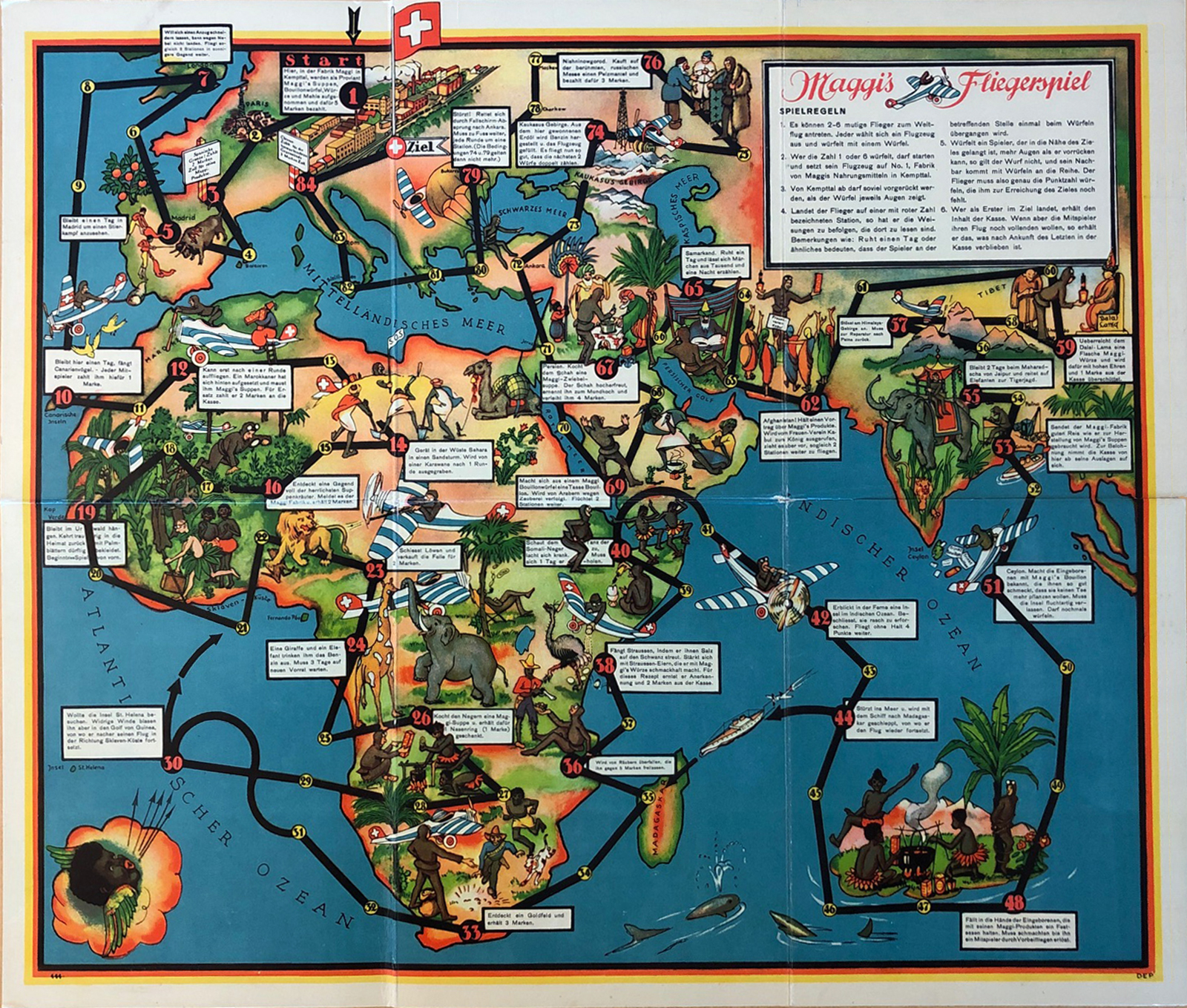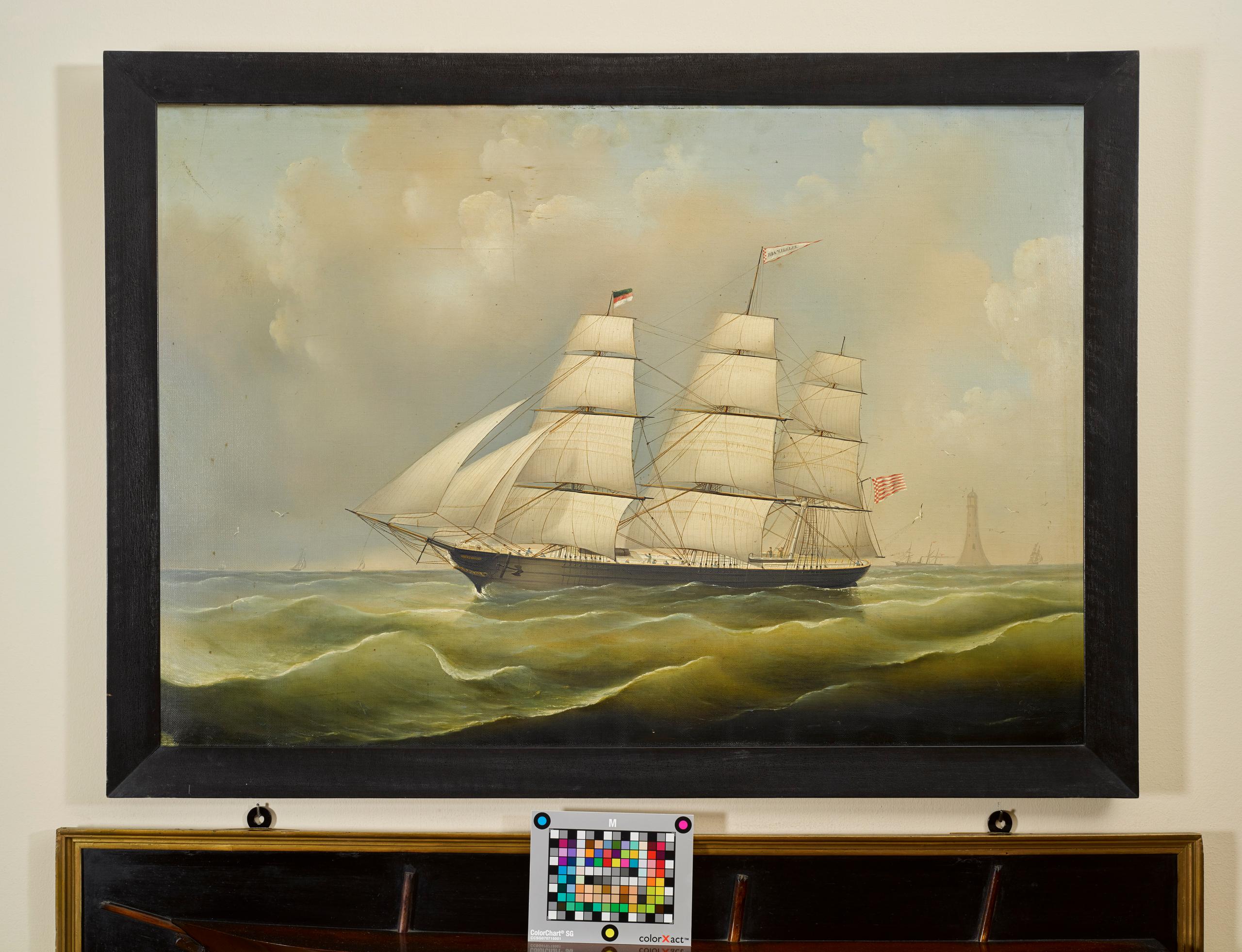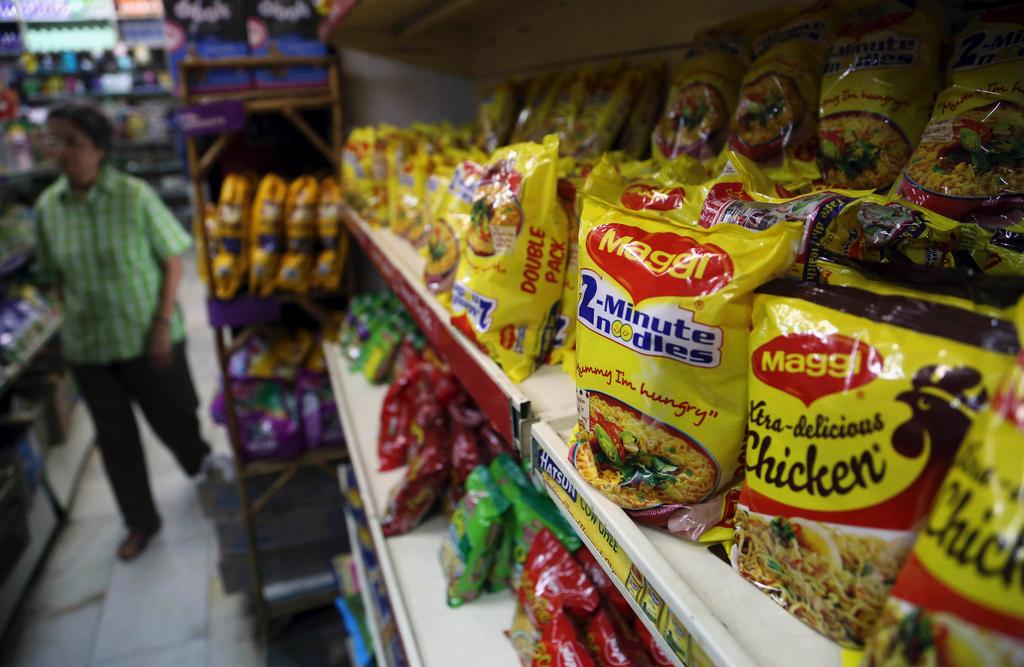Colonialism: How Swiss multinationals set their sights on the world

Switzerland is the home of many major multinational companies, many of which date back to the late 19th century, the high tide of colonialism. But is there a link between the rise of great Swiss corporate names and European colonial expansion? The issue turns out to be a complex one.
I found a board game a few weeks ago in the apartment that belonged to my grandmother. I vaguely remembered it from my childhood. The cardboard game was most likely produced in the 1930s by Maggi, the Swiss company famous for its soups and seasoning cubes.
It shows a map of Africa along with parts of Asia and Europe. The hero in the game is a pilot who takes off from Kempttal (Zurich), which is where Maggi had its main factory, and goes on to have all kinds of adventures on three continents.
More
Colonial stereotypes
What I didn’t notice as a child, because it corresponded to the usual stereotypes in children’s books at the time, was the way the people encountered by the hero are represented. Almost all inhabitants of sub-Saharan Africa don’t wear any clothes apart from a basic sort of kilt. Some strike dance poses, others have rings in their noses and cook in cauldrons hanging over a campfire.
The aircraft pilot tells the natives about Maggi products, and receives gifts and thanks in return. In French Sudan (now Mali) he finds “excellent herbs for soup”, which he tells Maggi about. From Calcutta (now Kolkata) he sends the company rice for soups. Passing through Afghanistan, he gives a talk about Maggi products to a women’s club in Kabul.

More
Switzerland and its colonists
The game captures many of the stereotypes of the colonial area. The aviator is a dashing adventurer, who maintains a paternalistic outlook on a world inhabited by tribes, “in keeping with the colonial vision of a world in which the Western white man dominates people of colour,” as Patrick Minder wrote in the book, La Suisse coloniale (Colonial Switzerland).
A multinational in a colonial world
At the same time, the board game shows a multinational company, which reaches markets around the world and imports raw materials with the most modern means of transport: aircraft.
Of course this is only a game, which at most shows that its originators lived in a world of assumptions common enough in industrialised societies at the time. But one wonders how a Swiss company came to represent itself in this way. Is there a relationship between the emergence of multinationals in Switzerland in the late 19th century and the colonial system?
“In fact, you cannot understand the economic history of Switzerland without factoring in colonialism,” noted Christof Dejung, a history professor at the University of Bern.
“However, you can’t just talk in general terms about a direct link between the rise of the big Swiss companies and colonialism.” The issue is more complex.
Switzerland and the first wave of “globalisation”
Between 1870 and 1910, Switzerland experienced rapid economic growth, accompanied by integration into the world economy. According to Thomas David, a professor at the University of Lausanne, in 1913 Switzerland ranked third among industrialised countries in terms of exports per capita, just behind Belgium and the Netherlands (two countries with colonial empires). At the same time, this country ranked first in terms of direct investment overseas.
Some Swiss companies started to “offshore” production as early as the 1870s, to get around customs tariffs and the trade barriers erected by many countries during the economic depression of 1873-1895, and also to bring down their manufacturing costs and find new sales opportunities. This trend just intensified after 1890.
The development in Switzerland was not much different from that in other smaller industrialised countries like Denmark, Sweden, the Netherlands and Belgium. The smaller home market made companies look for outlets abroad. In Switzerland however, there was a further trend. By 1914, according to a study by the German historian Harm Schröter, over half of the multinational companies from this group of five smaller states had their headquarters in Switzerland.
These included Brown Boveri (today’s ABB), CIBA and Geigy (Novartis), Maggi (Nestlé), Nestlé, Sulzer, Suchard (Mondelez International), Wander (Associated British Foods) and various others.

More
How Switzerland profited from colonialism
Role of the colonies
During the height of colonialism, Swiss industrial companies could hardly be found in the colonies and didn’t do any manufacturing there, according to Lausanne historian Thomas David.
Most that could be found were sales outlets. For example, Nestlé’s annual corporate report in 1913 shows numerous branch offices and agencies in Africa, India and Southeast Asia. However, factories were only found in Europe, the US and Australia.
“If you want to study the relations between Swiss multinationals and colonialism, you need to look at the trading companies. In Switzerland they have had a long tradition, going back to the 18th century,” explained Geneva historian Béatrice Veyrassat.
Major players like the VolkartExternal link brothers, the Basler HandelsgesellschaftExternal link or the Swiss trading companies in Asia that today all belong to DKSHExternal link dealt in cotton, cocoa, coffee and other raw materials. Over time, they came to control key sectors of international trade.
These trading companies provided the raw materials for manufacturing activities by industrial companies, with such things as coffee and cocoa. At the same time, they helped Swiss companies get into markets in the southern Hemisphere. “In this activity, the Swiss players showed a great ability to be flexible and adapt, both economically and culturally,” Veyrassat pointed out. To some extent they profited from the colonial system.
Switzerland’s main trading partners were countries that were at least formally independent. For some companies and industries, however, the colonies had a significant role, as suppliers of raw materials and as sales outlets.
Dream of expansion
So where does that leave the Maggi board game? In the 1930s, the Swiss company, among the pioneers of industrial food production, was active mainly in Europe. Unlike Nestlé, which acquired it after the Second World War, it did not have much of a presence overseas.
However, there was still some colonial perspective. The first advertisements for Maggi flavourings, which date back to the late 19th century, have a picture of two Africans making soup in the middle of a desert. In 1922 Maggi took part in the Marseilles Colonial Exhibition, at which time some of the company’s products were likely reaching the colonies.
Only in the post-colonial era did Maggi products have global reach. In Africa, in the space of a few decades, the red-and-yellow flavouring cubes became widely available in food market stalls and an essential ingredient in local cooking.

More
Nestlé’s noodles cleared by Indian labs
The aviator game may have simply been drawn from the imagination. Even so, the dream of commercial expansion was part of a colonial mindset, which included racist attitudes and a hierarchical view of relations between industrialised countries and less-developed parts of the world.
Translated from Italian by Terence Macnamee

In compliance with the JTI standards
More: SWI swissinfo.ch certified by the Journalism Trust Initiative














Join the conversation!